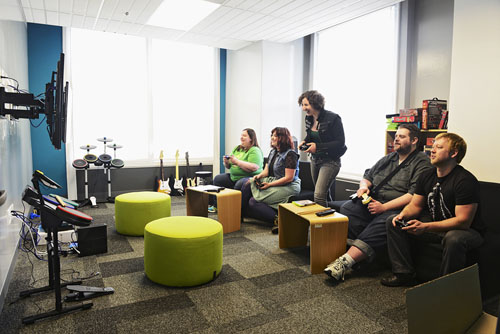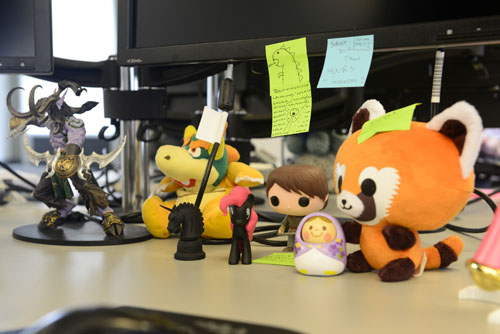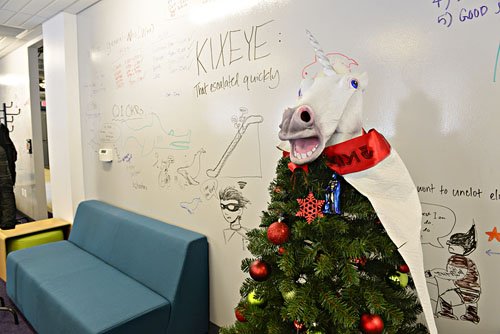BY VIVIAN MCINERNY
Those who think outside the Xbox probably don’t want to work in one.
 BY VIVIAN MCINERNY
BY VIVIAN MCINERNY
Those who think outside the Xbox probably don’t want to work in one.
When the online gaming company Kixeye sought room to grow, it wanted unique space befitting a creative company. Headquartered in San Francisco, Kixeye opened a service center last year on the sixth floor of the circa 1911 Yeon Building in Portland.
“Portland has a great gamer/nerd culture, and we thought we would be able to recruit great people,” says Matthew McComb, director of customer support. “That hypothesis has turned out to be true.”
The close proximity to San Francisco and lower costs also helped. Say a player gets stuck in a game of Backyard Monsters. Or maybe a Battle Pirates avatar is becoming a real time jerk. Gamers can contact troubleshooters in the Portland office.
Service centers such as this typically experience 26% employee turnover. Kixeye plays for keeps with enticing benefits including flexible work schedules, unlimited PTO, free meals and creative workspace.
“We haven’t had anyone quit yet,” says McComb. “I take that back. One guy quit but a month later called to say he’d made a terrible mistake.”
 Game on.
Game on.
Game-man style. The 9,000-square foot office is mostly open with five smaller meeting rooms. The rustic industrial design includes exposed ceilings and patchwork floors of polished concrete, graphic green commercial carpet and original vintage tile; enormous windows offer crow’s-nest views of urban life.
Play wall. Whiteboard paint turns walls into giant notepads for gaming cheat sheets, meeting topics and random drawings. Warning: Slouch against walls at the risk of becoming a human eraser.
Color monitor. Bright chartreuse walls, rolling file cabinets and chairs offer color pops. Rubbery, web-backed chairs built for comfort resemble the vector graphics of the vintage Asteroids game.
Bored room. The casual, mostly 20-something employees often gather after hours in the break room to — what else? — play games including Xbox, Playstation and completely off-the-grid old-school board games, the equivalent of engineers folding paper airplanes for fun. Consumers spent $21.53 billion on the game industry in 2013, according to the Entertainment Software Association.
 Accessory pack. Employees hated to see the festive Kixmas tree, aka the Seasonal Bush, removed after the holidays, so the artificial pine remains complete with super-hero ornaments and rubber unicorn-mask tree topper.
Accessory pack. Employees hated to see the festive Kixmas tree, aka the Seasonal Bush, removed after the holidays, so the artificial pine remains complete with super-hero ornaments and rubber unicorn-mask tree topper.
Hunger games. There is such thing as a free lunch. Breakfast, too. The spacious office kitchen is stocked with complimentary Corn Pops, Fruity Pebbles, soft drinks, Pop-Tarts, chips, bagels and such. Once a week, eats are ordered for “family lunch” around the table.
Bonus play. Employee excursions, like a recent outing to see Godzilla, are for entertainment purposes only. “Team building is a term corporations apply to sound fancier than it is to justify the expense to CFOs,” observes McComb. “It’s just fun.” Worldwide, Kixeye has grown from about 50 to 500 employees in approximately three years. According to GameDevMap.com, Oregon is home to 13 game developers and publishers. By comparison, California lists 382. FYI: Although game producers qualify for financial incentives from Oregon’s Governor’s Office of Film & Television, a service center does not.
Game context. The service center currently has 37 employees with growth room for 88.
Game changer. “Ten years ago, 90% of gamers were male,” McComb says. “Now it’s evenly split. It’s no longer a guy thing. It’s no longer a young thing. It’s no longer a nerd thing. It’s a thing.” About 35% (or 13) of the Portland office employees are women. The privately held Kixeye is profitable with revenue in the nine figures and backed by Trinity Ventures of San Francisco.


